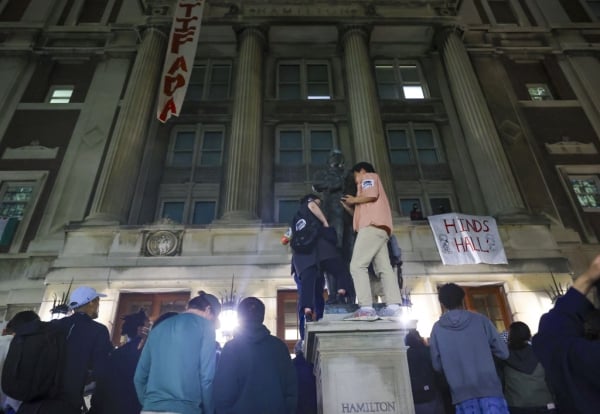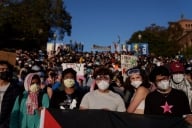You have /5 articles left.
Sign up for a free account or log in.
A group of pro-Palestinian protesters took over Hamilton Hall on the campus of Columbia University early Tuesday morning, displaying banners that said “Intifada” and “Student Intifada,” hours after the university started suspending students who refused to leave an encampment set up on a central lawn.
Protesters blockaded entrances to the building overnight with vending machines and furniture, NBC News reported. They unfurled another banner renaming the iconic building, Hamilton Hall, as Hind’s Hall, after a 6-year-old killed in Gaza.

Protesters outside the occupied Hamilton Hall at Columbia University
The building occupation came after Columbia began suspending protesters after warning them to abandon their encampment.
“We have begun suspending students as part of this next phase of our efforts to ensure safety on our campus,” spokesperson Ben Chang said during a press briefing Monday evening.
Following a breakdown in negotiations between protesters and administrators, the university issued written warnings to students occupying the encampment, setting a deadline of 2 p.m. Monday for them to leave or face consequences. Columbia’s Students for Justice in Palestine chapter, which was suspended last fall, posted photographs of the warning, which stipulated that protesters leave the encampment with their belongings, identify themselves to university personnel and sign a document promising to follow all conduct policies from now until June 30, 2025. If they did so by 2 p.m., the notice said, they would “be eligible to complete the semester in good standing” and avoid suspension.
“It is important for you to know that the University has already identified many students in the encampment,” the warning said, adding that those who do not comply could be faced with sanctions including expulsion.
Suspended students would have their IDs deactivated and be restricted from all Columbia “campuses, facilities and property, including all academic, residential and recreational spaces,” the warning said.
The SJP chapter encouraged participants not to sign the sheet and called on members of the university community to come out to defend the encampment. A group of faculty and staff in orange vests guarded the entrance.
The 2 p.m. deadline came and went, with no obvious signs of change in the encampment; video footage from around that time showed hundreds gathered on the South Lawn, with more picketing around the perimeter. According to the Columbia Spectator, student newspaper, the picketers dispersed by 3:50 p.m.
Around 5:30 pm, Chang announced the student suspensions, though he declined to say how many.
An Agreement at Northwestern
By contrast, protesters and university leaders at Northwestern University outside Chicago came to an agreement Monday to allow pro-Palestinian demonstrations to continue while also permitting finals week and graduation to go on without disruption, the Chicago Tribune reported.
Five days after students launched an encampment on Deering Meadow, a campus quad, Northwestern president Michael Schill announced in an email that students can remain on the lawn until June 1—as long as they take down tents and silence sound systems. The agreement also stipulates that only students and employees may participate in the protests.
Northwestern officials also agreed to welcome two Palestinian visiting faculty to the university, to provide scholarships for five Palestinian undergraduates and to create a new gathering space for Middle Eastern, North African and Muslim students.
In the announcement, Schill attributed the success of the negotiations to “the hard work of students and faculty working closely with members of the administration to help ensure that the violence and escalation we have seen elsewhere does not happen here at Northwestern.”
Arrests on Campus
Underscoring Schill’s point, several institutions saw arrests over the weekend into Monday. After students at Washington University in St. Louis set up an encampment on Saturday, university police made 100 arrests, officials announced the next day; they included 23 WashU students and 4 employees who have been charged with trespassing.
Protesters said on social media that the arrests came after they had already moved their camp once following a dispersal order from the police. Resist WashU and the university SJP chapter, two of the groups behind the protest, alleged that police brutalized demonstrators, attacking them with bicycles, tackling them, bashing their heads to the ground and destroying their supplies.
The university said in its announcement that after protesters set up camp, “It quickly became clear through the words and actions of this group that they did not have good intentions on our campus and that this demonstration had the potential to get out of control and become dangerous.” Protesters were asked to leave multiple times and refused, prompting the police intervention.
The announcement said that multiple police officers were severely injured while making the arrests.
Resist WashU and WashU SJP’s statement on the arrests condemned the university’s statement for failing to address the injuries they say they sustained at the hands of the campus police.
Also on Saturday, Northeastern University in Boston shut down an encampment and arrested just under 100 protesters, including 29 Northeastern students and six employees, according to a message from Chancellor Ken Henderson and Provost David Madigan. They said the arrests were necessary due to the presence of individuals who were not part of the university community.
“While these non-affiliates are clearly passionate about their cause, we are not able to hold them accountable for their actions through the university’s traditional avenues and codes of conduct,” they wrote.
The administrators also noted that there had been “persistent use of intolerant and hurtful speech” on campus since the encampment was established. This likely referred to an incident in which an individual yelled “Kill the Jews”; news outlets reported it came from a pro-Israeli counter-protester mocking the pro-Palestinian demonstrators. The statement said that hateful incidents are being investigated “irrespective” of who participated in them.
At the University of Texas at Austin, arrests continued into Monday as police shut down an encampment, arresting 40 people, according to The Texas Tribune. It is the second time in less than a week that protesters have been arrested on UT Austin’s campus, where organizers have been occupying the institution’s South Mall on and off since last Wednesday. The first spate of arrests was widely criticized by free speech experts but celebrated by right-wing politicians.
It is not yet confirmed how many of the 40 individuals arrested are students.
“We strongly condemn UT administration bringing the police once again to campus in an abhorrent attempt to violently suppress students,” the Palestinian Solidarity Committee, a pro-Palestinian student group at UT Austin, wrote on Instagram. “We strongly support our fellow students’ right to protest againist [sic] the genocide in gaza [sic] and to demand that UT divest from death. We will support anyone arrested today.”
Three protesters were also arrested at the University of South Florida in Tampa, according to the Tampa Bay Times. After a group of demonstrators set up tents near a plaza on the main campus around noon, they received a warning that they had violated university policy by failing to request permission to set up the tents. Those arrested included a student, an employee, and one individual not affiliated with the university. Monday’s arrests at USF mark the first arrests in Florida related to a pro-Palestinian encampment, the Times noted.








